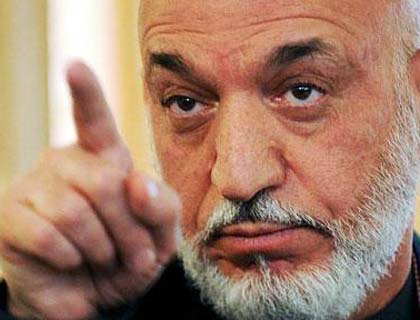Few days after terrible incident in Kandahar province - murdering of 16 innocent civilians by an American soldier, President Hameed Karzai, while condemning it with strongest possible language, asked foreign allies for rescheduling military withdrawal timetable. He said that 2013 should be the deadline for military withdrawal instead of prefixed date, 2014.
It is not the first time that he opens mouth in criticism of his close allies. His standings often came as a shock for audience and proved consequential. During his incumbency, he frequently has made irritating statements, dealing blows to his relation with neighbors and international allies. For example in the case of Pakistan, several times, he has flipped flopped from one extreme to another. One day, he brands it as shelter of al-Qaeda, principle supporters of Taliban-led insurgencies and the mastermind behind instability and security crisis, On the other hand, a close ally in anti-insurgency struggle, friendly neighbor and “a brother to Afghanistan”.
However, there are individuals supporting his temporary policies, arguing that such remarks are necessary to deal with contingencies, and they are kind of constructive diplomacy of his Excellency. But closely assessing the outcomes of his sensitive remarks, it appears how favoring arguments look awkward and unreasonable.
First of all, diplomacy is far different from what Mr. President does. In a short and clear definition: diplomacy is winning the hearts of one side, meanwhile avoid damaging the relation with the other one. But did the positions of Mr. President in variety of incidents accord with this definition? I am afraid, not.
Not going far away and studying all his standings during past ten years of his incumbency as head of the state. Just put a glimpse to his position in the case of assassination of former President, Mr. Burhanuddin Rabbani. He was assassinated by a person claimed to be an authorized Taliban messenger in his very house and in the most barricaded location of the capital Kabul. He was complicated figure that many viewed able to play critical role in bringing Taliban leaders to the negotiation table.
He was of course one of the main fighters against Taliban since the very appearance of the armed group from east-western part of the country in early 90’s. He led northern front against the so-called Emarat-e-Islami, the name of Taliban regime government. He enjoyed deep influence among Tajik community which is the second largest ethnic group in Afghanistan.
Clearly he was appointed as chief of High peace council in order to give peace process somehow a national prestige.
So, his death indeed was a terrible blow to President Karzai’s administration. He lost a potential friend that could gather his community behind him and strengthen his government. There was the possibility that his death could fuel tension and cause instability.
So, he had to do something to calm down mourners and bring the situation under control as a consequence of losing a close and powerful figure. What he did? He criticized Pakistan and held it responsible for the assassination. He said that his government should directly held talks with Islamabad.
His statements dealt terrible impacts on the bilateral relationship, meanwhile failed to relieve people as they held several protests and chanted anti-government slogans.
A Similar incident with far broader consequence repeated in case of burning of Quran and shooting in Panjwae districts of Kandahar province. In the first case, Mr. President and other Afghan officials condemned the incident and rightly asked for thorough investigation. Apologies of the top US officials and Hameed Karzai’s efforts to calm down Afghan civilians did not work out well.
The violence broke out after the Bagram incident, more than thirty people were killed and many more injured, which is triple of the number killed by a mentally disordered American soldier in Panjwae district. Instead Taliban did quite well. Their leaders asked Afghan soldiers and police to turn their arms against foreign forces. Within few days, around six American soldiers were shot dead by Afghan associates, which severely affected the already fledgling trust. NATO pulled out all staffs working in ministries in and around Kabul. It is widely believed that restoration of the trust takes longer time.
In case of Panjwae shootings, the situation turned far dangerous. President Karzai strongly condemned the attack and expressed deep regret for victims’ family members. But he did not come short and went far beyond simple sympathetic statements. He expressed words which were out of diplomatic literature like demon and Satan. With all efforts of Washington allies, he exploited the anti-American situation and pressurized it to handover the responsibilities of Bagram prison.
In meeting with US defense minister, Mr. Leon Panetta, he asked for acceleration of transition and completion of withdrawal in 2013. He said that Afghan security forces can hold the security responsibilities across the country now and also strongly demanded that foreign forces should retreat from districts and villages to their bases.
The reaction of President Karzai was rapid and sensitive. As I noticed previously that only in violence that followed Quran burning incident, triple of the number of Panjwae incident lost lives.
Experts widely believe that 2014 is too early for military withdrawal and Afghan security forces are not ready to hold the security responsibilities. But President, angry due to Panjwae’s unfortunate incident, claims that Afghan security forces are ready to take the responsibilities now.
His position has severely undermined the relation with foreign allies. On the other hand, his criticisms could not summon people behind his government. Instead Taliban exploited both incidents quite well.
Therefore, his remarks only have made the situation far complex rather than doing anything fruitful to his government and Afghanistan.

